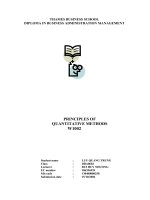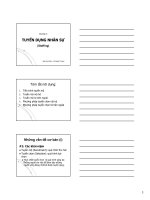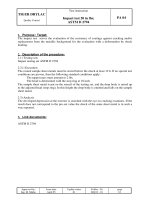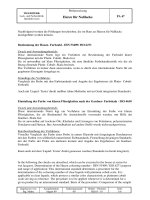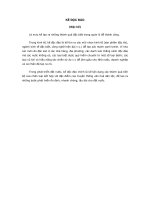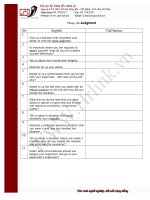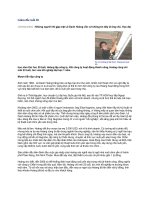Tài liệu Clauses doc
Bạn đang xem bản rút gọn của tài liệu. Xem và tải ngay bản đầy đủ của tài liệu tại đây (61.86 KB, 3 trang )
Clauses
(Adapted from Understanding and Using English, Azar)
EXERCISE #1: Add commas where necessary and change the adjective clause pronoun to
that
if possible.
1. Susan and Dave, who are friends of mine, are visiting me this weekend.
(“Who” cannot be changed to “that.”)
2. The people who are visiting me this weekend live in Ohio.
(No commas; “who” can be changed to “that.”)
3. Only people who speak English, Spanish, and French should apply for the job.
4. Leonor who speaks all three languages applied for the job.
5. The rice which we had for dinner last night was very dry.
6. Rice which is grown in many parts of the world is an important food crop.
7. I have wonderful memories of my hometown which is in Pennsylvania.
8. I lived in a town which is located in Pennsylvania.
9. South Beach which is one of Florida’s biggest tourist attractions is always
crowded.
10. The beach which Robert likes the best is in Fort Lauderdale.
11. A rebel is a person who resists or fights authority.
12. Ghandi who was a rebel believed in peaceful resistance.
13. One of the most useful materials in the world is glass which is made mostly from
sand, soda, and lime.
14. I broke the glass which was on the dining room table.
1
EXERCISE #2: Combine the two sentences into one sentence with an adjective clause,
using that, who or whom, which, or whose (use all possible forms, including ø).
a. Add commas if necessary.
b. Remember the steps for changing sentences into adjective clause (see
below).
1. Find the noun or pronoun in the 2
nd
sentence that refers to the same noun in
the 1
st
sentence.
2. Choose the correct relative pronoun (who, whom, that, which, or whose).
3. Replace the noun in the 2
nd
sentence with the appropriate relative pronoun.
4. If necessary, move the relative pronoun to the front of the 2
nd
sentence.
5. Now you have an adjective clause. Place the entire adjective clause after the word
in the 1
st
sentence.
1. a. Rosie speaks German and English.
b. She is from Munich.
2. a. That man is the Director of Research at the University.
b. You met his son at the party last week.
3. a. Those shoes were too expensive.
b. I like those shoes the best.
4. a. Mr. Wilson is a very efficient person.
b. He likes to get things done quickly.
5. a. Who are those women?
b. They’re talking to William.
6. a. Sonia enjoyed the movie.
b. We recommended it.
2
7. a. My daughter was afraid to go to sleep.
b. She doesn’t like thunder and lightening.
8. a. Peter is extremely artistic.
b. His mother is a sculptor.
9. a. I broke the gold chain.
b. My father gave it to me last year.
10. a. The professor is an anthropologist.
b. Her office is next to mine.
11. a. Hurricane Andrew caused billions of dollars of damage.
b. It occurred in August 1992.
12. a. We drove to Naples.
b. It is located on the west coast of Florida.
13. a. Did you meet the man?
b. We were talking about him last night.
Leslie Biaggi, 2003
Miami-Dade College
Document downloaded from the “For the Classroom” area of The Grammar Exchange website, www.longman.com/grammarexchange.
Pearson Education.
3
